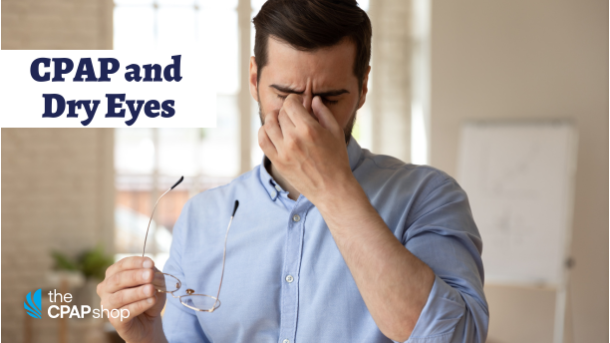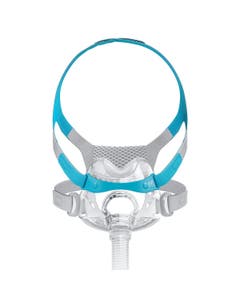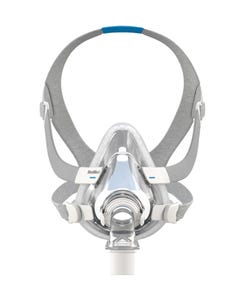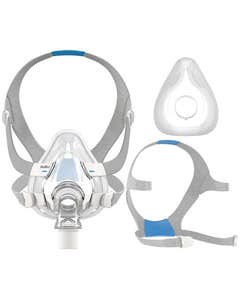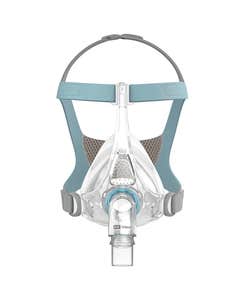CPAP And Dry Eyes: Prevention And Treatment
One of the common side effects of CPAP therapy is dry eyes. Because of the dry, pressurized air used in CPAP, eyes, nose and throat can often become dry with regular CPAP use.
What Is Dry Eye?
Dry eye is a condition in which your eyes do not produce enough tears to keep eyes moist. Dry eye can be temporary due to dry weather conditions and environmental factors, or become a consistent health problem in some individuals. The eye may become irritated, red, and inflamed due to the lack of moisture.
Symptoms Of Dry Eyes With CPAP?
Some dry eye symptoms include:
- An uncomfortable feeling in the eye
- A feeling that you have something in your eye
- Eyes burning and/or stinging
- Eyes looking red or being sensitive to light
- Blurry vision
Why Does CPAP Cause Dry Eyes?
Air Leaks in the Mask
If you start to experience dry eye and use a full face CPAP mask during CPAP therapy, check your mask for leaks. Leaks around the upper part of the mask can cause the dry pressurized air to blow directly into the eyes, drying them out.
Air from Other Sources Moving Across the Eyes
Air from other sources may be affecting your eyes. Check to see of fans or your air conditioning may be running while you sleep, which may be drying out your eyes at night.
Health Conditions
Often dry eye is a health condition unrelated to CPAP. Speak to your doctor to see if your tear ducts are producing enough moisture to keep your eyes hydrated. Often prescription eye drops can help with the condition.
Allergens In Your Bedroom
If you are susceptible to allergens, check your bedroom. Dust, pet dander and mold can also contribute to dry eye irritation. If you only experience dry eye while you sleep, then the allergens may be present only in your bedroom.
Other Causes Of Dry Eyes
Age
As we get older, tear ducts may produce fewer tears which can lead to regular dry eye. Use of over the counter or prescription eye drops on a regular basis can help.
Airborne environmental factors
Sometimes the air in our homes or our community contain harmful pollutants or natural allergens, which can contribute to dry eye. Change the filters in your HVAC and use an air purifier to help reduce airborne pollutants in your home.
Contact lenses
Contact lenses can help you look your best without glasses, but their close proximity to your eyes can cause irritations like dry eye. Switch to eyeglasses for a period of time to see if your dry eye goes away.
Medications
Some medications can reduce tear production as a side effect. Research the medications you use to see if dry eye is a side effect and see if you can reduce dosage. If the medications are essential to your health, speak to your doctor about your symptoms to find an available alternative medication without the dry eye side effect.
Autoimmune conditions
Some autoimmune health conditions can reduce tear production. As you manage this condition, eye drops may be necessary to help reduce the irritation of dry eye.
Blepharitis
Blepharitis causes inflammation of your eyelid and dry eye symptoms. Be sure to treat this condition using compresses or over-the-counter eyelids cleaners to clean the eyelid. In some instances, you may have to take a prescribed antibiotic.
Meibomitis
Meibomitis causes inflammation of the oil glands around the eye and may also cause dry eye symptoms. Prescribed anti-inflammatory medications can help heal the oil glands and improve the condition.
Floppy eyelid syndrome
Floppy eye syndrome causes eyelids to become loose and rubbery during sleep. They often roll back exposing the eyes to environmental irritants, which can lead to symptoms similar to dry eye. Floppy eye syndrome is often associated with sleep apnea. A recent study found that 25.8% of those with obstructive sleep apnea also had floppy eye syndrome.1 Ointments, special pillows and sleep masks are useful remedies for managing floppy eye syndrome.
How To Prevent Dry Eyes From CPAP?
If health and environmental factors are ruled out, then CPAP may be causing your dry eye. That doesn’t mean you should stop therapy. Here are some tips to help you eliminate or reduce dry eye during CPAP.
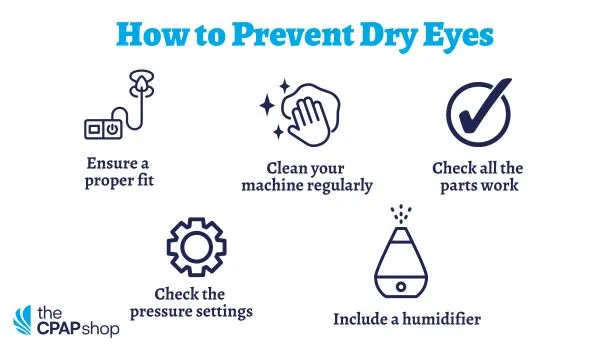

Ensure A Proper Fit
A poorly fitting CPAP mask, especially a full face mask may be allowing air to blow into your eyes, thus drying them out. Make sure you have followed your mask fitting guidelines. If it appears that the mask has become loose and cannot be adjusted properly, it is time to replace your CPAP mask.
Check The Pressure Settings
High air pressure settings on your CPAP machine can intensify the air flow into the nasal cavity and into the eyes. Check with your doctor about using a lower pressure setting.
Clean Your Machine Regularly
Dirty CPAP equipment can lead to eye and nasal irritations and infections. Follow the cleaning guidelines from your manufacturer to ensure your hose and mask are clean.
Include A Humidifier
Many CPAP machines include built-in humidifiers, or you can add a humidifier as an accessory. Infusing CPAP airflow with moisture helps soothe many CPAP therapy side effects including dry eye, nose, and throat.
Check That All Parts Are Functioning
Check your CPAP equipment regularly. Masks, hoses, and cushions wear out and lead to leaking. Follow guidelines from your manufacturer for replacing parts and be aware if some parts are no longer working or have considerable wear.
Use Artificial Tears
Over the counter or prescription artificial tears can help eyes stay hydrated. If you have to manage a dry eye condition, then using these safe remedies at bedtime can help you wake up without eye irritation.
Find And Fix The Air Leaks In Your Mask
Leaking masks are the most common reason for eye irritations during CPAP. Make sure to replace your mask if you struggle to make it fit or if you feel air blowing inside the mask other than into your mouth and nose.
Concluding Thoughts
Don’t let dry eye be the reason you stop CPAP therapy. Your sleep apnea treatment has long-lasting health benefits that make staying CPAP compliant important. Speak to your doctor, review your CPAP equipment, and find a solution to dry eye without compromising therapy for your sleep disorder. If you have questions or would like to learn more, give our knowledgeable staff a call at 866-414-9700 today!
References
Advanced Sleep Medicine Services Inc. What is Floppy Eyelid Syndrome and How is it Related to Sleep Apnea?



